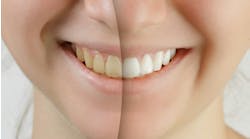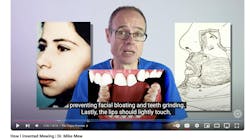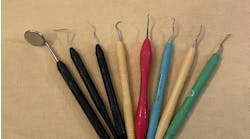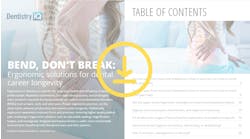To see Dianne Glasscoe's original article, please search for "Speed Demon" in the search box located on the left side of your computer screen. Following is a letter that appeared in the September edition of RDH in response to that article.
Speed it up, "girls"
Dear RDH:
In the July issue, Dianne Glasscoe responded to a letter (Speed Demon) from a hygienist who complained about another hygienist in the office doing a prophy in 10-15 minutes. The remarks concerning this service were negative and Dianne gave a list of 13 items a hygienist should do which would be impossible to do in 10 minutes.
The public, and indirectly, the dentist, are the ultimate sources of what treatment hygienists should do and the level of service and quality that is needed. Today, people want fast food, fast banking, fast gas station fill-ups, and fast dental service. No one likes to wait. No normal person wants to be in the dental chair having his or her teeth cleaned for 45 minutes when the job can be done in 10 or 15 minutes. Patients do not tolerate long procedures and if a quality service is offered at another office in less time, they will take their business to that office. A dental prophylaxis consists of removing calculus and polishing the teeth. The extras mentioned by Dianne (e.g. blood pressure, exam, inquire about dental problems, etc.) does not need to be done by the hygienist and may not be desired by the patient or the dentist. The dentist may want to do this him/herself as is office policy.
A well-trained dental hygienist with sharp instruments and an ergonomically efficient technique can easily do a good scaling and polishing in 10 minutes on most "normal" patients. I'm not talking about someone who has 30 inches of calculus on his lower anterior teeth, but just an average patient who keeps his or her six-month recall appointments. To say it takes more time to do the cleaning and that anyone doing the treatment in less time is providing lower quality treatment is ridiculous. If, after treatment, the mouth is clean and the dentist and patient are happy, then that is success. Do not equate retardation with quality. In today's competitive world, where the consumer dictates the terms, you better provide fast, efficient, quality service. Anything else will result in the loss of the patient, his or her family, and your job. In my and many of my colleague's practices, fast hygienists earn more money and get more respect from the dentists and patients. The slow ones get less. The real slow ones get fired. It's a tough world out there, girls. Are you up to the challenge?
E.J. Neiburger, DDS
Waukegan, Illinois
Following are some of the letters we have received in response to Dr. Neiburger. We will publish additional letters soon.
Dear RDH,
When I read the response to Speed Demon by the dentist E.J. Neiburger, I had to laugh. This type of dentist is the reason I finally retired (so happily) from dental hygiene in June this year. The attitudes of the guys who want everything at record speed cause substandard quality, and prompted me to re-evaluate my career after 10 years. He probably doesn't allow his staff any breaks for fear they may not generate an extra $75 prophy in that lost 10 minutes. I had plenty of wonderful patients who appreciated my quality near hour-long service. These are the same patients who came running from offices like Neiburger's saying they had been given the shaft, and were so happy to find me. I was requested and complimented continuously by patients. I've never seen a fast hygienist get respect from anyone except the DDS. Hmmmm.......... The fast "girls" end up leaving. The real fast "girls" end up bleeding. There's no challenge to be "up to." I thank God everyday for being able to stay home now as a full-time mom!!
Lisa Beach
Retired RDH
Palm Beach, FL
Dear RDH,
I am compelled to write after reading Dr. Neiburger's response in the September issue regarding the speed demon letter.
To be honest, when I read the speed demon letter I, at first, felt that the veteran hygienist was being a bit unrealistic with all the time she was expecting "speedy" to spend with each patient. I felt it was a bit presumptuous of the veteran to judge 'speedy" and felt that she should offer suggestions to the new hygienist on how to be thorough and efficient but not expect her to take as long as she took herself. We all work differently and at different paces. There is no magic number for how long a hygienist needs, but I know 10 or 15 minutes is certainly not enough time either.
I am deeply disturbed that the dentist who responded felt that it was none of the hygienist's concern to do the "extras" as he put it. I can honestly say that I do not take blood pressure unless I feel it is indicated by the medical history review and interview, but I certainly see the benefit of taking BP at every visit. There is a link between heart disease and periodontal disease. Any continuing-education course will teach you that. Most people with high BP are asymptomatic.
I do not believe that inquiring about dental problems is an extra.
Obviously, the dentist feels that hygienists are mindless robots and can offer no help in determining what ails the patient. I would hate to work for him and I definitely wouldn't want to be his patient.
A hygienist who receives her bachelor's or associates in dental hygiene is trained thoroughly on oral cancer screening and exam and often are the first person to alert the patient and/or dentist of dental disease or cancer.
I'd like to offer some advice to "speedy" and to the dentist.
1. Always start the appointment interviewing the patient, even if you see them every six months and never assume that everything is written in the medical history. Have an index card handy with pertinent questions.
2. Be prepared to take a BP or implement an efficient system in which BP can be taken before the patient is in your chair.
3. Do a thorough exam, noting suspicious areas and pointing them out to the patient without diagnosing.
4. Don't wait for the end of the appt for OHI or pointing out areas that "look suspicious." If you talk during the prophy, all you have to do is reiterate what you just told them as you walk them out. Patients don't like long lectures, so get them while they are a captive audience.
5. Do OHI in the patient�s mouth with a hand mirror during flossing and cleaning and brush their teeth (patients like this because it is informative and it freshens their breath before they walk out the door).
6. Don�t work for someone who dictates how much time you need because he wants money. Don't let a patient's busy schedule dictate treatment either. I doubt Dr. Neiburger would want the patient to say "I don't care if you put aside 1 1/2 hours for a crown, just patch it up with a filling." It�s your license!
As my dental hygiene instructor Dr. Christman used to say, "The lawyers will ask you how many years did you go to dental/dental hygiene school, and how many years of hygiene/dental school did the patient have?'" CASE CLOSED. HAND OVER YOUR LICENSE.
Bottom line � We're responsible!
Finally, this is precisely why preceptorship is a bad idea. I am blessed with a great boss who values my education and skills but for those who don't, I see the aforementioned scenario becoming a reality.
Rebecca Z. Morales, RDH
Laredo, Texas





